Matcha vs Yerba Mate: A Complete Guide to Energy, Focus, and Health Benefits
May 21, 2025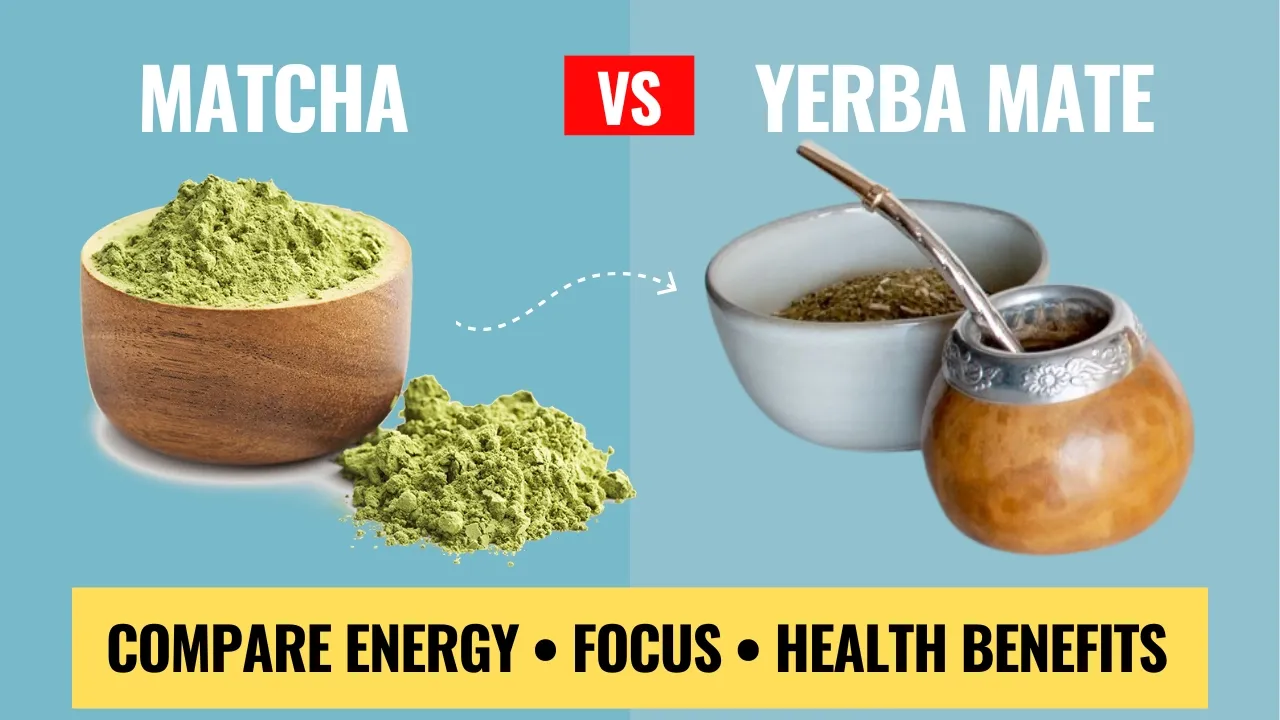
Both yerba mate and matcha green tea are praised for their energy, focus, and antioxidant benefits—but how do they really compare?
Whether you are deciding which to drink during intermittent fasting or just looking for a healthier alternative to coffee, this guide breaks down yerba mate vs matcha in terms of caffeine, metabolism, mental clarity, and more. In this article you will discover the unique strengths of each—and how to choose the best one for your health goals.
What Is Yerba Mate vs Matcha? A Quick Overview of Both Teas
Is Yerba Mate the Same as Matcha?
No—while both are green, antioxidant-rich beverages often associated with clean energy and mental clarity, they come from entirely different plants, regions, and traditions.
Yerba mate comes from the Ilex paraguariensis plant, native to South America. Traditionally consumed in countries like Argentina, Paraguay, and Brazil, yerba mate is brewed from dried leaves and enjoyed for its naturally occurring caffeine, theobromine, and polyphenols. It’s known for providing smooth energy, improved focus, and appetite suppression.
Matcha, on the other hand, is a powdered green tea made from the Camellia sinensis plant. Originating in Japan, it’s cultivated under shade, then stone-ground into a fine powder. Matcha is consumed as a suspension (not an infusion), meaning you ingest the whole leaf—maximizing the intake of antioxidants, particularly EGCg, a catechin with cancer-fighting potential.
So while some people mistakenly assume that yerba mate is matcha due to their green leaf appearance and health reputations, they are completely different in origin, preparation, and nutritional profile.
If you’ve ever searched for “yerba mate matcha,” now you know: they’re two distinct powerhouses—each with unique benefits.
Yerba Mate vs Matcha: Caffeine Levels Compared
When comparing yerba mate vs matcha caffeine, it’s important to look beyond just the numbers and understand how each drink affects your body and mind.
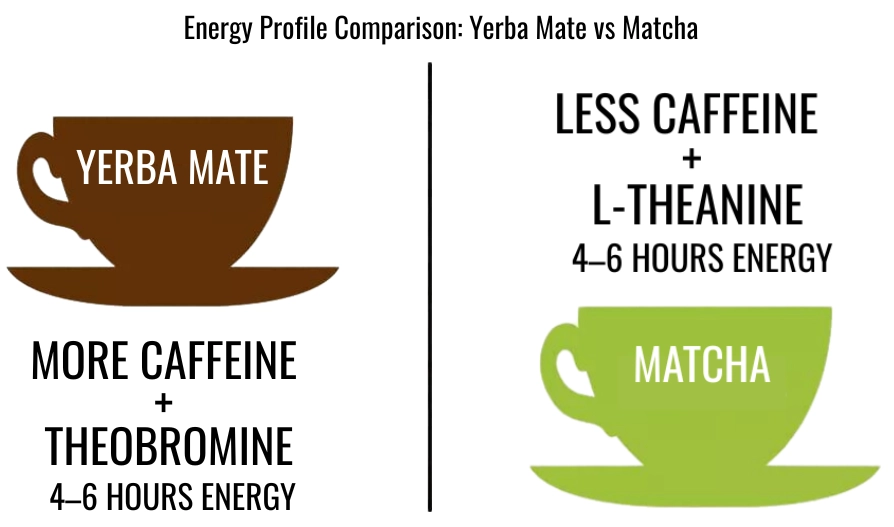
Yerba mate typically contains 70–90 mg of caffeine per serving, depending on the product and how it’s brewed. In loose-leaf form or in products like Unimate, that amount can go even higher—especially if is highly concentrated extract. Yerba mate also contains theobromine, a compound found in dark chocolate that provides a smooth, mood-enhancing energy boost without the spikes and crashes associated with coffee.
Matcha green tea, by comparison, delivers around 30–70 mg of caffeine per serving, depending on how much powder you use. But what makes matcha unique is its high content of L-theanine, an amino acid that promotes calm, focused alertness. The result is a gentler energy curve that supports mental clarity and reduces stress, making it a favorite among those seeking a more mindful boost.
So, in the debate of matcha tea vs yerba mate:
- Yerba mate offers stronger, sustained energy, particularly for physical activity or productivity
- Matcha offers a calmer, slower release of energy, ideal for mental focus and stress reduction
Yerba mate takes it to the next level, delivering a caffeine profile similar to premium coffee—but with the added balance of theobromine and chlorogenic acids to improve both energy and mood.
Yerba Mate vs Matcha for Energy and Focus: Which Boosts You Better?
When it comes to mental clarity and sustained energy, both yerba mate and matcha have loyal fans—and for good reason. But the type of boost they offer can feel very different.
Yerba mate is often described as providing a motivated, alert energy—great for productivity, workouts, or staying mentally sharp for extended periods. Thanks to a combination of caffeine and theobromine, mate supports physical endurance and mental drive without the overstimulation or crash often linked to coffee.
Matcha, as a comparison, is the go-to for those seeking calm focus. While it does contain caffeine, its standout ingredient is L-theanine—an amino acid that works synergistically with caffeine to promote relaxed alertness. This makes matcha ideal for study, meditation, or creative work where mental calmness is as important as clarity.
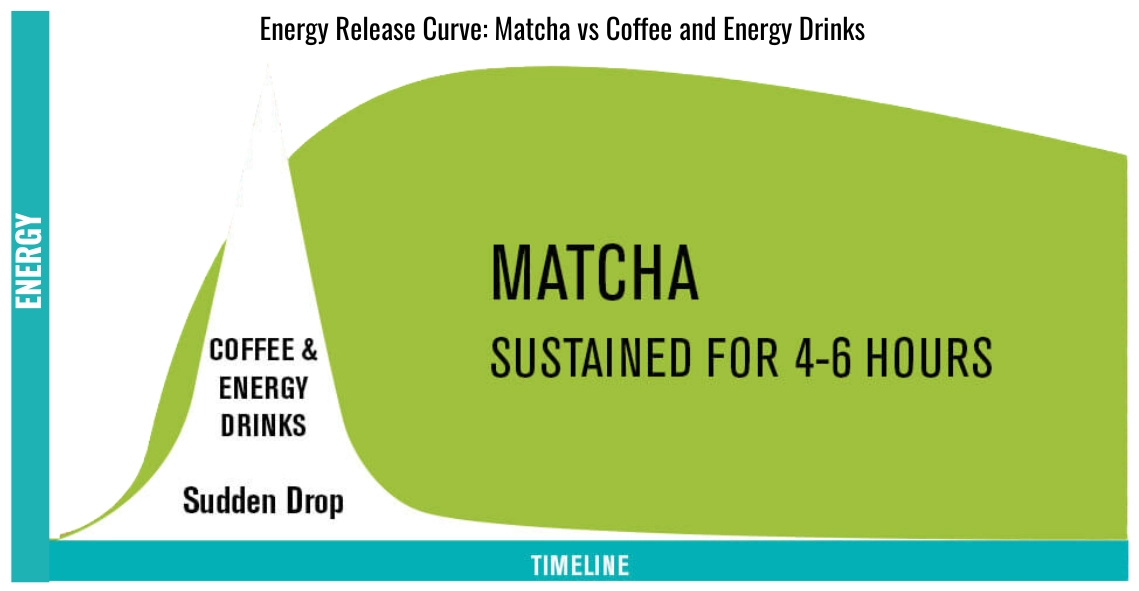
So in the matcha and yerba mate debate:
- Yerba mate is ideal for physical energy, motivation, and endurance
- Matcha shines in moments where calm mental focus is the goal
If you’re comparing mate tea vs matcha for your daily routine, the best choice depends on what kind of energy you need—and how you want to feel while you’re getting it.
Yerba Mate vs Matcha for Weight Loss and Metabolism: What Works Best?
If you’re choosing between yerba mate vs green tea for weight loss, both have proven benefits—but they work in slightly different ways.
Yerba mate is well-known for its ability to suppress appetite, making it a powerful companion during intermittent fasting. It helps you go longer between meals without feeling deprived, and it also enhances fat oxidation, which supports weight loss during calorie restriction. Yerba mate, in particular, has been shown to increase satiety and reduce cravings—a key reason it’s become popular among those using intermittent fasting for fat loss and insulin sensitivity.
Matcha, on the other hand, is prized for its metabolism-boosting effects. Rich in catechins like EGCg, matcha helps increase thermogenesis (your body’s calorie-burning process) and can improve blood sugar stability—especially when consumed between meals. Its mild appetite control and fat-burning support make it a steady tool for metabolic balance.
So in the yerba mate vs matcha tea comparison for weight loss:
- Yerba mate excels at controlling hunger and supporting fasting
- Matcha boosts metabolic rate and enhances calorie burn
Nutritional Benefits of Matcha and Yerba Mate Compared
Both matcha green tea and yerba mate are celebrated for their dense nutritional profiles—but each delivers its own unique set of health-enhancing compounds.
Matcha is exceptionally rich in catechins, especially EGCg (epigallocatechin gallate)—a powerful antioxidant linked to cancer prevention, heart health, and blood sugar regulation. Because matcha is consumed as a whole-leaf powder, you ingest more of these nutrients than you would with traditional steeped teas. Matcha also contains L-theanine, which not only supports cognitive performance but also contributes to mood balance and reduced stress.
Yerba mate, is packed with chlorogenic acids, another group of potent antioxidants. These compounds are linked to improved metabolism, better insulin sensitivity, and anti-inflammatory benefits. Yerba mate also provides a variety of micronutrients, including B vitamins, potassium, magnesium, and manganese—making it a broader source of daily wellness support.
So in the debate of yerba mate tea vs green tea, the choice depends on your goals:
- If you're focused on detoxification, immune health, and catechin intake, matcha may be your go-to
- If you're looking for metabolic, cardiovascular, or anti-inflammatory support, yerba mate shines
That’s why I rely on Unimate and Unicity Matcha Energy—both are high-quality, clinically supported options that deliver the full benefits of these traditional teas with modern-day consistency and convenience.
Functional Tea Alternatives: How Unimate and Matcha Energy Compare
If you want to enjoy the full benefits of yerba mate or matcha—without the guesswork or variability of traditional brewing—Unimate and Unicity Matcha Energy are my go-to choices. They deliver unmatched consistency, potency, and convenience in every serving.
Unicity Unimate is a high-quality Yerba Mate extract with natural ingredients to boost your mood and your endurance. This yerba mate is grown, harvested, and traditionally fire-dried and roasted in South America. It then undergoes a specialized purification and extraction process, providing 10 times the amount of bioactive compounds vs. all other yerba mate.
This method enhances key compounds like chlorogenic acids and theobromine, resulting in up to 10x the bioactive power of traditional yerba mate brews. It’s also listed in the Prescribers’ Desk Reference (PDR)—a rare distinction that underscores its clinical reliability and safety.
Unicity Matcha Energy, sourced from premium Chi-Oka Matcha grown in Japan, provides a smooth, long-lasting energy boost with zero glycemic impact. It’s rich in EGCg and L-theanine, supporting calm mental clarity without the crash. Like Unimate, it’s also listed in the PDR, highlighting its quality and credibility.
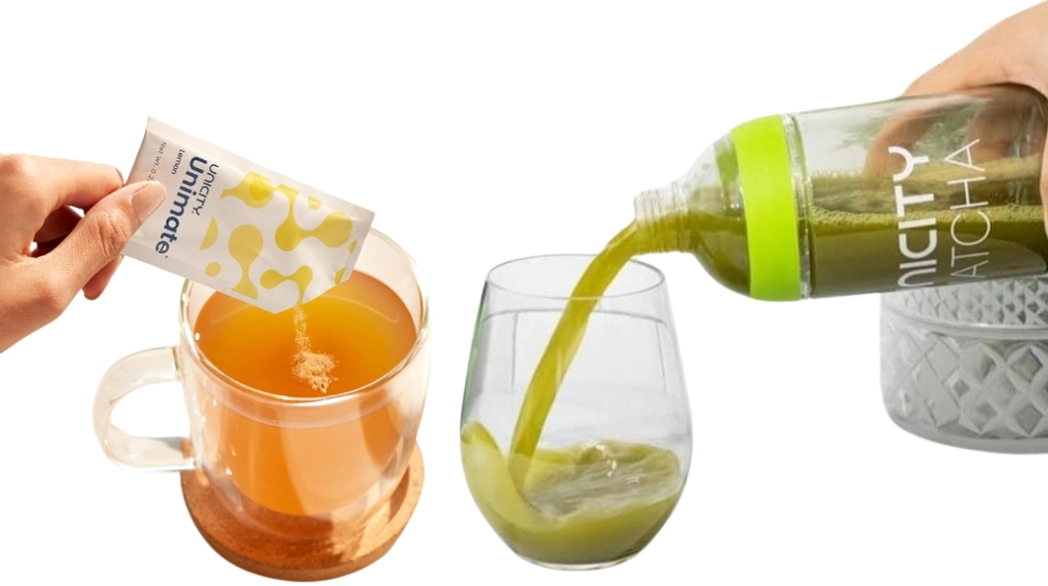
Both come in convenient single-serve stick packs—no prep, no mess—just pure functional energy you can take anywhere.
-
Unimate is available in refreshing flavors like lemon, lemon-ginger, and salted caramel
-
Matcha Energy features a unique fruit-blend profile, including blueberry and pomegranate
My Morning Routine: Unimate + Matcha Every Day
I’ve personally found a simple ritual that works wonders: I mix one stick of Unimate with one stick of Matcha Energy in a liter of water each morning. It’s replaced my desire for coffee completely, extended my fast comfortably until noon, and gives me steady, clear-headed energy without any crash. It’s become the easiest, healthiest habit I’ve ever built—and I actually look forward to it every day. I ‘ve called it “My Matrix” drink.
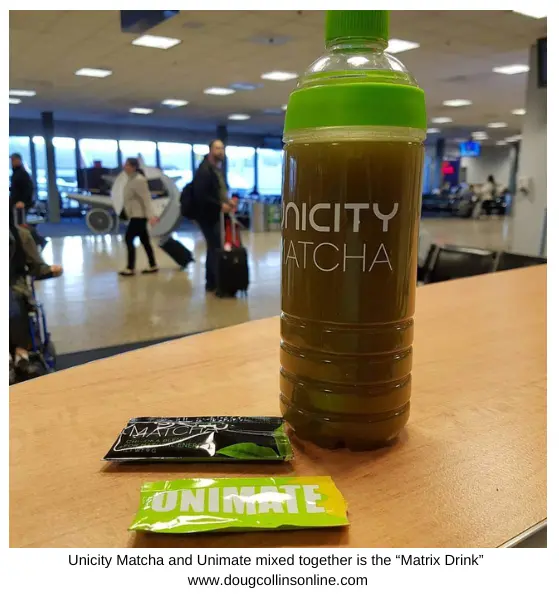
Whether you need focused endurance, metabolic support, or calm mental energy, Unimate and Matcha Energy deliver superior results—without the sugar, inconsistency, or crash of most off-the-shelf alternatives.
Yerba Mate vs Matcha: Which One Is Right for You?
When it comes to choosing between yerba mate and matcha, there’s no one-size-fits-all answer. It really comes down to your energy needs, health goals, and lifestyle preferences.
- If you're looking for clean energy, improved focus, and support with intermittent fasting or appetite control, yerba mate—especially in its ultra-concentrated form as Unimate—is a powerful choice.
- If you prefer a calmer energy curve, enhanced mental clarity, and support for stress reduction, detox, and metabolism, matcha delivers beautifully—especially when sourced from high-grade Chi-Oka leaves like those in Matcha Energy.
And if you want the best of both? You don’t have to choose.
Many people (myself included) enjoy combining Unimate and Matcha every morning. It’s the ultimate fusion of physical energy and mental clarity—without the crash, caffeine overload, or sugar.
Whether you start with one or try both together, you’re making a simple upgrade that can dramatically improve your mornings, your focus, and your long-term health.
Ready to try it for yourself? Order Matcha Energy and Unimate yerba mate directly from Unicity at the best wholesale price—and start your mornings with clean, focused energy.
Related Articles:
Yerba Mate vs Matcha: Frequently Asked Questions
Which is better for you: matcha or yerba mate?
It depends on your goals. Matcha supports calm focus, metabolism, and detox, while yerba mate is known for energy, appetite control, and mood. Many people benefit from using both.
Is yerba mate the healthiest tea?
Yerba mate is one of the most nutrient-dense teas available. It’s rich in antioxidants, polyphenols, and compounds like theobromine and chlorogenic acid. It supports energy, metabolism, and cardiovascular health.
Does matcha have more caffeine than yerba mate?
No—yerba mate typically has more caffeine per serving than matcha. Matcha has around 30–70 mg of caffeine per cup, while yerba mate often ranges from 70–100 mg.
Can you drink matcha or yerba mate every day?
Yes, both are generally safe for daily use in moderate amounts. Choose high-quality, purified products like Unimate and Unicity Matcha to avoid unnecessary additives or contaminants.
Is matcha or yerba mate better for weight loss?
Yerba mate is ideal for appetite suppression and fasting, while matcha supports metabolism and fat oxidation. Using both can enhance results when paired with healthy eating or intermittent fasting.
Is yerba mate the same as matcha?
No—yerba mate and matcha are completely different. Yerba mate is a South American holly plant; matcha is powdered green tea from Japan. They have different nutrients, effects, and preparation styles.
Why is Unimate better than traditional yerba mate?
Unimate undergoes a patented 5-step process that purifies and concentrates active compounds like chlorogenic acids and theobromine. It delivers consistent energy without sugar or synthetic additives.
Can I mix Unimate and Matcha together?
Yes! Many people enjoy combining them in one drink. The result is a balanced blend of energy, clarity, and appetite control—perfect for starting your day or extending your fast.
Ready to Feel Better Than You Have in Years?
Try the Feel Great System Today
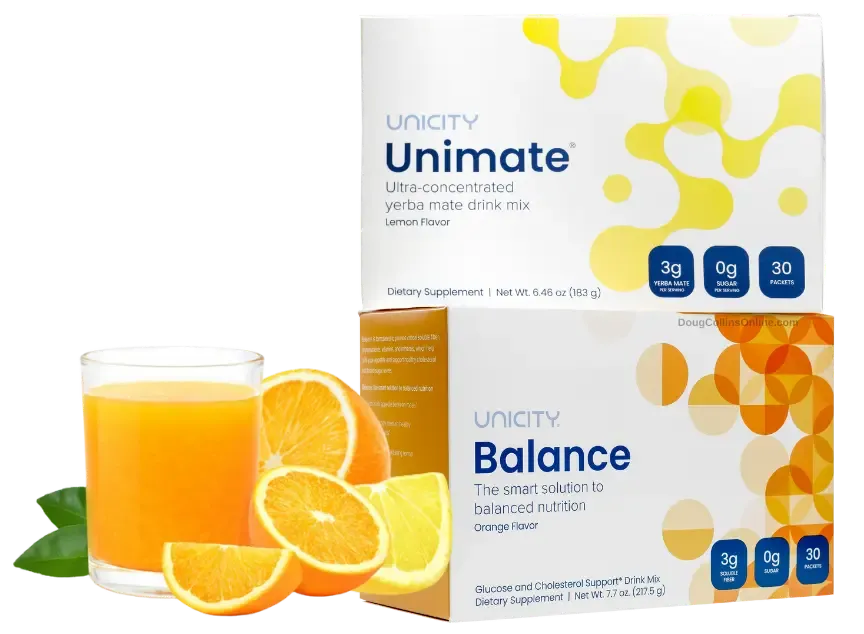
More energy. Better focus. Healthy blood sugar support. Sustainable weight loss.
Even if everything else you tried before has failed.
Order now with a 100% satisfaction guarantee.
Have questions? Contact Doug:
Click the Message/Chat Button
Send Email
Call/Text: 1-902-201-0245


